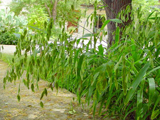Native Plants

Q. Who is Mr. Smarty Plants?
A: There are those who suspect Wildflower Center volunteers are the culpable and capable culprits. Yet, others think staff members play some, albeit small, role. You can torture us with your plant questions, but we will never reveal the Green Guru's secret identity.
Did you know you can access the Native Plant Information Network with your web-enabled smartphone?
Ask Mr. Smarty Plants is a free service provided by the staff and volunteers at the Lady Bird Johnson Wildflower Center.

rate this answer
Wednesday - July 29, 2009
From: Georgetown, TX
Region: Southwest
Topic: Grasses or Grass-like
Title: Replacement for St. Augustine grass
Answered by: Nan Hampton
QUESTION:
I live in Georgetown, TX. I have an acre lot with many large Live Oak Trees. Currently we have St Augustine grass growing, but with the drought, it's not working out well with rainbirds putting down two tenths of an inch per hour. I'm only watering every 5 days for an hour on each station, so the grass is not receiving its inch of water that is recommended. What other options are available that can also tolerate deer in the area every day? Thank you,ANSWER:
The drought and heat in Central Texas are really taking their toll on plants this summer and you are right, St. Augustine requires lots of water to do well. Unfortunately, trying to replace it during the drought is not going to be easy either. Anything you replace it with, despite the fact that it might be more drought tolerant, is going to take considerable water to become established. Additionally, there isn't a native turf grass that will work well in the shade of your liveoaks. Sunny areas would do well with Bouteloua dactyloides (buffalograss), but buffalograss doesn't fare very well in the shade. There are attractive native grasses that do well in the shade, but they aren't going to create your typical urban lawn that is mowed to a height of 4-5 inches. Still, if you want to create a more natural landscape, they would be ideal.SHADE-FRIENDLY GRASSES:
Tridens flavus (purpletop tridens)
Chasmanthium latifolium (Inland sea oats)
Elymus canadensis (Canada wildrye)
Bouteloua curtipendula (sideoats grama)
Elymus virginicus (Virginia wildrye)
Nassella leucotricha (Texas wintergrass)
Native American Seed in Junction has a Shade-Friendly Grass Mix that includes these grasses, or you can purchase seeds of these individually. They normally grow 1 to 2 feet high, but they can also be mowed occasionally. Native American Seed also has helpful advice about establishing and caring for native lawns. Please see our How To Article "Native Lawns", also.
As an alternative native grass you could establish a sedge lawn. The article by John Greenlee Sedge Lawns for Every Landscape will give you more information. Here are some sedges that are possibilities for the Central Texas area:
Carex planostachys (cedar sedge)
Carex cherokeensis (Cherokee sedge)
Finally, there are a couple of low-growing groundcovers that will grow in sun or shade and are more drought-tolerant than St. Augustine grass. They are:
Phyla nodiflora (turkey tangle fogfruit)
Calyptocarpus vialis (straggler daisy)
More Grasses or Grass-like Questions
Reseed Buffalograss in Early Spring in San Antonio
January 14, 2011 - When is best time to put down Buffalo grass seed in 78260 area. How much dirt should I put over existing sodded buffalo grass, which is now sparse?
view the full question and answer
What is blooming in NJ in Late November?
November 27, 2015 - I am a beekeeper in Edison, NJ. My bees are still bringing pollen even this late in the season (Thanksgiving). What plants or trees are still blooming? The color of the pollen is a pale yellow.
view the full question and answer
Grasses for a wildflower meadow in Greenville, SC
August 17, 2009 - Dear Mr. Smarty Plants,
I have been establishing a wildflower meadow in Greenville, SC. Our current wildflowers are:
Purple Coneflower
Perennial Black-eyed Susans
Cardinal Flower
Butte...
view the full question and answer
Seed source for Carex texensis from Louisville KY
May 02, 2012 - Your reply to my question re a grass for my Kentucky home with cistern only water available was much appreciated, Carex texensis was recommended. I am unable to find this product for sale other than ...
view the full question and answer
Inland sea oats as backfrop for pigeon berry
August 20, 2007 - I am thinking of using inland sea oats as a backdrop for pigeon berry (Rivina humilis) in a shady area along my foundation. Will this combination work, or will the sea oats outcompete the pigeon berr...
view the full question and answer
| Support the Wildflower Center by Donating Online or Becoming a Member today. |

